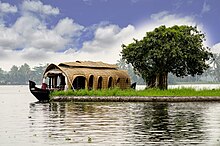A backwater is a part of a river in which there is little or no current. It can refer to a branch of a main river, which lies alongside it and then rejoins it, or to a body of water in a main river, backed up by the sea tide or by an obstruction such as a dam. [1] Manmade restrictions to natural stream flow or temporary natural obstructions such as ice jams, vegetation blockage, or flooding of a lower stream can create backwater. [2]
Alternative channel

If a river has developed one or more alternative courses in its evolution, one channel is usually designated the main course, and secondary channels may be termed backwaters. [3] The main river course will usually have the fastest stream and will likely be the main navigation route; backwaters may be shallower and flow more slowly, if at all. Some backwaters are rich in mangrove forest. [4] This results in a more diverse environment of scientific interest and worthy of preservation. [5] [6] Backwaters also provide opportunities for leisure activities such as canoeing and fishing. [7] [8]
The term has been applied as a metaphor to physical and social areas that have been bypassed. It may apply to places that have been neglected in economic development, [9] or in the expression a "cultural backwater". [10]
Water backed up by an obstruction

When a section of a river is near the coast or another feature that sets its base level, the section influenced by the conditions at its mouth is termed a backwater. If a river flows into a lake or sea, it is the region in which the slope of the river decreases because the lower water flux permitted at the mouth causes the water to back up. Where the river outlet is strongly affected by tides, the cyclic change in base level changes the portion of the river that is a backwater. As a result, fresh and salt water may become mixed to form an estuarine environment. [11]
See also
References
- ^ Merriam Webster Dictionary
- ^ Langbein, W. B.; Iseri, Kathleen T. (1960). "General Introduction and Hydrologic Definitions, Manual of Hydrology: Part 1. General Surface-Water Techniques" (PDF). pubs.usgs.gov. Geological Survey Water Supply Paper 1542-F. U.S. Geological Survey. Retrieved February 10, 2019.
- ^ Wargrave Local History Society Latest News - November 2003 Hennerton and the Backwater Archived 2011-07-24 at the Wayback Machine
- ^ "Chettuva in Thrissur: Flaunting Kerala's biggest mangrove forest". OnManorama. Retrieved 2018-08-28.
- ^ "E. HOHAUSOVÁ, P. JURAJDA Restoration of a river backwater and its influence on fish assemblage Czech J. Anim. Sci., 50, 2005 (10): 473–482" (PDF). Archived from the original (PDF) on 2017-07-05. Retrieved 2010-07-29.
- ^ "John C. Marlin BACKWATER RESTORATION OPPORTUNITIES: ILLINOIS RIVER Waste Management and Research Center, Illinois Department of Natural Resources One" (PDF). Archived from the original (PDF) on 2016-03-03. Retrieved 2010-07-29.
- ^ "Vistt Thames Free Family Fun". Archived from the original on 2012-01-25. Retrieved 2010-07-29.
- ^ "Suggested paddles Cliveden Reach on the Thames". Archived from the original on 2010-07-23. Retrieved 2010-07-29.
- ^ The Cambridge Economic History of Modern Britain
- ^ Yee, Amy (2002-05-10). "A Cultural Backwater No Longer". Wall Street Journal. ISSN 0099-9660. Retrieved 2018-10-07.
- ^ Southard, John B. (2006). "Chapter 5: Open-Channel Flow" (PDF). An Introduction to Fluid Motions, Sediment Transport, and Current-generated Sedimentary Structures. MIT OpenCourseWare. Retrieved 16 March 2010.